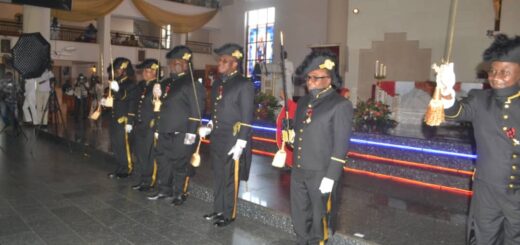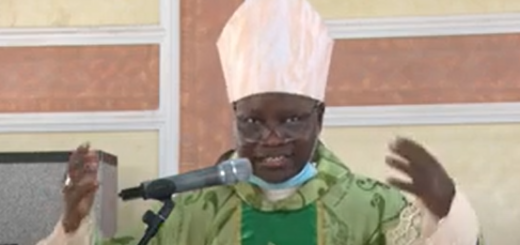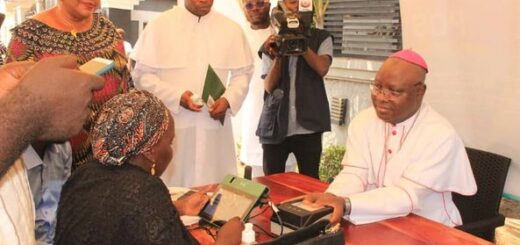The prayer of the humble pierces the clouds
by ARCH BISHOP · October 26, 2025
30th Sunday in Ordinary Time, Year C, St. Cyril’s Pastoral Area, Kado Kuchi. Homily by Archbishop I. A. Kaigama, 26.10.2025.
Readings: Sirach 35:12-14,16-19; 2Timothy 4:6-8,16-18; Luke 18:9-14
Theme: The prayer of the humble pierces the clouds
Today with joy, I have come to celebrate with you the blessing of your Church, the conferment of the sacrament of confirmation to your children and church members and the celebration of the sacrament of matrimony for five couples. We thank God the Almighty for granting you the resources to build a place of worship here. We thank all the parishioners who have been actively involved in the project. May God bless you all and bring all that has to do with this building to a comprehensive finish.
I ask all the faithful and people of goodwill in the Archdioceseto support the new pastoral areas so that the pastoral areas still without a proper church building may receive help to have their dignified place of worship as soon as possible.
Dear parishioners of St. Cyril, together with your priest, Fr. Emmanuel Unamba and his associate Fr. Julius Yashim, this milestone is the fruit of your faith, hard work, and steadfast commitment. You have shown that when God’s people work together in love and unity, great things are possible.
May this new church not only be a structure of beauty but also a living symbol of your vibrant faith and witness. Let it be a place where hearts are renewed and communities transformed by the love of Christ.
In today’s Gospel, Jesus contrasts two men who went to the Temple to pray – a Pharisee and a tax collector. The Pharisee is the kind of man we would want as a neighbour, a man of principle and discipline. But his prayer reveals the sickness of his soul. He stands there, confident, full of himself, and his prayer is not a conversation with God but a report to God. “I thank you that I am not like the rest of men.” His eyes are not on God, but on his neighbour, the tax collector, whom he uses as a measuring stick for his own holiness.
And then there is the tax collector. He doesn’t have a list of good deeds to present. He has no defence. He stands, as the gospel says, “far off,” feeling unworthy even to approach the holy place. He will not even raise his eyes to heaven. His entire prayer is an honest cry from the depths of his emptiness: “O God, be merciful to me, a sinner.”
Both went to meet God, but only one went home justified. Why? Because what counts before God is not how long or loud we pray, but the disposition of our heart. We must note that God Looks at the heart, not the appearance.
The first reading from Sirach reminds us that “the prayer of the humble pierces the clouds.” and the Psalmist adds: “Yahweh is near to the broken-hearted, he helps those whose spirit is crushed” (34:18).
The book of Sirach was written at a time in ancient Israel, where power was often used to oppress the poor weak. It was at this period that Sirach proclaimed to the people a God who is just and impartial. He said that the Lord hears the cry of the oppressed and is not deaf to the wail of the orphan or the widow. This is a God that is not swayed by wealth or status. The prayer of the lowly pierces the clouds, reaching God’s heart. Our civil and political leaders should take note that prayers of the millions of hungry, poor and insecure Nigerians will pierce the heaven and will some maybe heard by God.
Even in the midst of the insecurity and poverty suffered by many of us deprived deliberately of social privileges and advantages or benefits, our strength lies in the fact that God will hear our prayer and those who do such wrong against the poor will someday experience the vanity and the ephemeral nature of their undeserved wealth.
Despite our agonizing situation, we are still called to a life of spiritual introspection today. When we set our lives beside the holiness of others, perhaps we can have all the reasons to boast. It is easier for us to say, “I pray more than he prays.” “I give more than he gives.” “I do better than him.” “I do not cause any trouble to others.” “I look better than he does.”
“Compared to others, I am a saint.” In other words, we take our pride from being better than others. But the question is not, “Am I as good as my neighbour?” the question is, Am I as good as God wants me to be?” When we set our lives beside the holiness of God, there is nothing that we can boast of as we see our unworthiness.
The Pharisee represents those who pray to impress others or to justify themselves.
The tax collector came with empty hands, holding only his own failure. And it was precisely those empty hands that God could fill with mercy. No wonder Jesus states in today’s gospel that “Whoever exalts himself will be humbled, and whoever humbles himself will be exalted.”
At another situation, Paul realizing that the end of his earthly life was near, makes an assessment: “I have fought the good fight to the end; I have run the race to the finish; I have kept the faith” (2 Tim 4:7). For each one of us, dear brothers and sisters, Paul is a model. May Divine Goodness allow us to make a similar judgment of ourselves. St Paul continues, “the Lord stood by me and gave me power, so that through me the message might be fully proclaimed for all the Gentiles to hear” (2 Tim 4:17).
Unlike the Pharisee, Paul’s confidence is not self-righteousness; it is gratitude. He knows that everything he accomplished came from God’s grace.
In our Nigerian context, we might think of the tax collector as the corrupt politician, the fraudulent businessman, the notorious area boy that does “yahoo-yahoo,” Everyone knows them for the wrong reasons.
The transformation of our nation, however, begins with the conversion of our own hearts and especially the hearts of our public officials who are custodians of our patrimony. For all of us, we cannot demand mercy from God for our country while withholding it from our neighbour. We cannot ask God to heal our land if we are not first willing to acknowledge our own part in its sickness.
As we approach the Eucharist today, may we come like the tax collector – empty-handed but open-hearted. God is not swayed by titles or status, nor is He impressed by outward show. Whether we are rich or poor, educated or uneducated, what matters before God is the truth of our hearts.
This message speaks powerfully to us here in Kado Kuchi – a growing community, full of faith and hope. God sees your efforts to build His Church, even when your resources are small. He sees your sacrifices, your quiet prayers, your perseverance amid challenges. Your humble prayers reach heaven.
How often do we, in the quiet of our hearts, thank God that we are not like those people; not like the corrupt leaders looting our nation’s treasury; not like the kidnappers terrorizing our highways; not like the gossipers in the marketplace, or the lazy colleague at work?
The Pharisee’s prayer is the prayer of pride, and pride is a wall that blocks the flow of God’s mercy. It makes us judges of others and prisoners of ourselves. Remember, prayer is a conversation with God, not a presentation. Let our prayer be a simple, constant cry from the heart: “Lord Jesus, Son of the Living God, have mercy on me, a sinner.” How I wish this prayer which we make will be the prayer of all our elected or appointed leaders.
We pray that our humble prayers be for the transformation of hearts; changes that will ease our sufferings and by God’s grace leaders who will be transparent, accountable and empathetic to the agony of the poor will emerge. May our Mother Mary continue to intercede for us. Amen.




